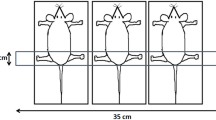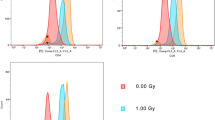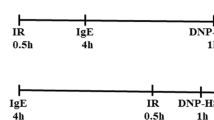Abstract
AN early and transient rise in the number of circulating neutrophilic granulocytes is known to occur in the blood of various mammals, including man, after exposure to radiation1–5. Neither the aetiology of this radiation effect, however, nor the source of the mature neutrophils has been established. The evidence discussed in the present communication suggests that the granulocytosis is caused by the release of one or more pharmacologically active biogenic amines, which mobilize large intravascular reservoirs of mature neutrophils.
This is a preview of subscription content, access via your institution
Access options
Subscribe to this journal
Receive 51 print issues and online access
$199.00 per year
only $3.90 per issue
Buy this article
- Purchase on Springer Link
- Instant access to full article PDF
Prices may be subject to local taxes which are calculated during checkout
Similar content being viewed by others
References
Minot, G. R., and Spurling, R. G., Amer. J. Med. Sci., 168, 215 (1924).
Patt, H. M., Smith, D. E., and Jackson, E., Blood, 5, 758 (1950).
Stodmeister, R., Sandkuhler, S., and Fliedner, M. T., Proc. Second United Nations Intern. Conf. on the Peaceful Uses of Atomic Energy, 22, 238 (Geneva, 1958).
Bacq, Z. M., and Alexander, P., Fundamentals of Radiobiology, second ed. (Pergamon Press, 1961).
Gidali, J., and Feher, I., Blood, 23, 27 (1964).
Veninga, T. S., and de Boer, J. E., Intern. J. Rad. Biol., 6, 501 (1963).
Bertelli, G., Falta, W., and Schweiger, O., Zeitschr. f. klin. Med., 71, 23 (1910).
Hortling, H., Acta Med. Scand., Suppl., 201 (1947).
Bierman, H. R., Kelly, K. H., Cordes, F. L., Byron, R. L., Polhemus, J. A., and Rappoport, S., Blood, 7, 683 (1952).
Gordon, A. S., Siegel, C. D., Dornfest, B. S., Handler, E. S., and LoBue, J., Trans. N.Y. Acad. Sci., 23, 39 (1960).
Bierman, H. R., Byron, R. L., Kelly, K. H., Cordes, F., White, L. P., and Littman, A., Blood, 8, 315 (1953).
Vejlens, G., Acta Path. Microbiol. Scand., Suppl., 33 (1938).
Athens, J. W., Haab, O. P., Raab, S. O., Mauer, A. M., Ashenbrucker, H., Cartwright, G. E., and Wintrobe, M. M., J. Clin. Invest., 40, 989 (1961).
Athens, J. W., Raab, S. O., Haab, O. P., Mauer, A. M., Ashenbrucker, H., Cartwright, G. E., and Wintrobe, M. M., J. Clin. Invest., 40, 159 (1961).
Page, I., Physiol. Rev., 38, 277 (1958).
Maloney, M. A., and Patt, H. M., in Haemopoiesis, Ciba Foundation Symposium (edit. by Wolstenholme, G. E. W., and O'Connor, M.), 262 (J. and A. Churchill Ltd., London, 1960).
Athens, J. W., Ann. Rev. Physiol., 25, 195 (1963).
Author information
Authors and Affiliations
Rights and permissions
About this article
Cite this article
RIXON, R., BAIRD, K. Mechanism of Radiation-induced Granulocytosis. Nature 213, 388–389 (1967). https://doi.org/10.1038/213388a0
Issue Date:
DOI: https://doi.org/10.1038/213388a0
Comments
By submitting a comment you agree to abide by our Terms and Community Guidelines. If you find something abusive or that does not comply with our terms or guidelines please flag it as inappropriate.



